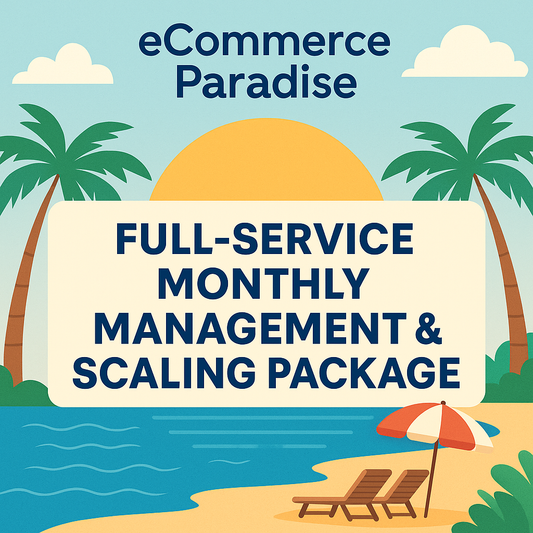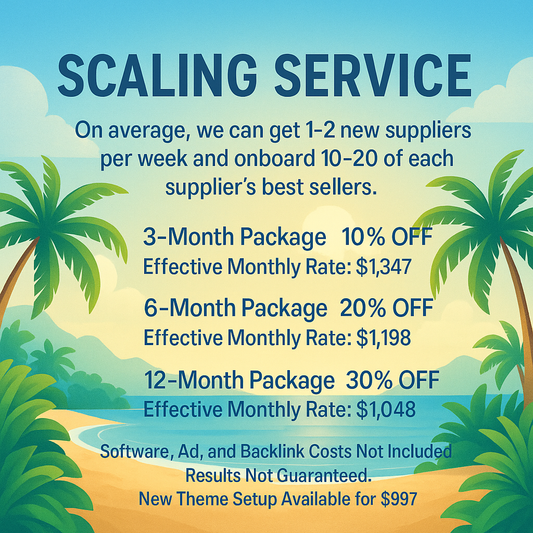
Outsmarting Giants: Compete with Retailers via SEO
In today's digital landscape, competing with larger retailers, especially those with deep pockets, can feel daunting. But worry not; there are tactics you can adopt to level the playing field. Using SEO effectively can be a game changer for your brand. You don't need the budget of a giant retailer to succeed; what you need is strategy, insight, and some killer tactics. Let’s unpack how to leverage Ecommerce SEO to not only survive but thrive in this crowded marketplace.
Understanding the Importance of SEO
Before diving into practical strategies, let’s clarify what SEO means for your business. SEO, or Search Engine Optimization, involves optimizing your website to rank higher on search engine results pages, making it easier for potential customers to find your store. The higher your website ranks, the more traffic you can attract, which translates into higher sales.
The Challenge of Competing Against Larger Retailers
Larger retailers often have extensive resources that allow them to dominate search engine rankings. They can invest heavily in Google Shopping Ads, optimizing their listings, and even crafting intricate marketing campaigns across various platforms. However, understanding that SEO can be your secret weapon is the first step in competing effectively.
Niche Down Your Market
One of the most powerful tactics you can utilize is focusing on a niche market. Larger retailers tend to stock a broad variety of products, but they often overlook specialized niches. By defining your niche, you can optimize your SEO strategy around targeted keywords that are less competitive but highly relevant. This means you can rank for terms that large retailers may not focus on, driving qualified traffic to your site.
Here are a few steps to find your niche:
- Identify your passions and expertise.
- Research market demands through tools like Google Trends.
- Analyze your competition: What markets are they in, and where do they focus?
- Explore customer pain points — what do they need that larger retailers aren’t providing?
Optimize Your Website for SEO
Once you've carved out your niche, it’s time to optimize your website. Here are some essential steps to implement:
Keyword Research
Understanding what your customers are searching for is crucial. Use keyword research tools like Ahrefs or SEMrush to discover primary and secondary keywords related to your niche. Focus on long-tail keywords that are specific and show purchase intent. For example:
- Instead of just “running shoes,” consider “best running shoes for flat feet.”
- Instead of “watches,” try “durable watches for camping enthusiasts.”
On-Page SEO
Once you have selected your keywords, incorporate them into critical areas of your website:
- Title Tags: Keep it catchy and informative.
- Meta Descriptions: Summarize what users can expect from your page.
- Header Tags: Use H1, H2, and H3 tags to create a structured hierarchy.
- Product Descriptions: Write detailed, unique descriptions that incorporate your keywords naturally.
Quality Content is King
Creating valuable content that resonates with your audience is vital. Start a blog related to your niche, and focus on providing useful, actionable advice. Here are some types of content you can create:
- How-to Guides: Teach your audience about your niche products.
- Product Reviews: Share insights on specific products in your niche.
- Industry Trends: Write about what’s new and relevant.
By establishing yourself as an authority in your niche, you'll not only improve your SEO but also build trustworthy relationships with your audience. As a bonus, when people find solutions to their problems on your site, they’ll be more likely to return and make a purchase.
Local SEO – Targeting Your Community
If you have a local angle to your business or want to attract customers from a specific region, leveraging local SEO is a smart strategy. Here’s how:
- Google My Business: Set up and optimize your listing to appear in local searches.
- Local Keywords: Incorporate location-based keywords into your content.
- Get Reviews: Encourage satisfied customers to leave positive reviews; this boosts local search rankings.
Utilize Google Shopping Ads Wisely
While large retailers often dominate paid advertising, there are effective ways for smaller brands to benefit from Google Shopping Ads. Start with a solid product feed that uses proper keywords and high-quality images. Optimize your budget: you don’t need to outbid larger entities; instead, you can focus on niche targeting with lesser-known products. This is where data-driven decisions come into play. Analyze performance and adjust accordingly.
Email Marketing: Building Relationships
Email marketing can significantly enhance your SEO efforts. By building an email list, you create a direct line to your audience without relying on social media algorithms or search engines. Here’s how you can get started:
- Collect Emails: Use landing pages, and incentives like discounts, to gather email addresses from site visitors.
- Engaging Content: Send out newsletters that offer value, whether through blog posts, exclusive discounts, or industry news.
- Personalized Campaigns: Use segmentation to tailor your messages based on customer interests.
When customers feel valued and educated, they are more likely to make purchases and even refer others to your store.
Collaborate with Influencers
In the ecommerce world, partnerships can substantially enhance your visibility. Collaborating with influencers within your niche allows you to tap into their dedicated audience. Choose influencers who genuinely believe in your products and can share authentic experiences. Here’s how to make this collaboration fruitful:
- Research & Align: Ensure their values align with your brand.
- Incentivize: Provide unique discount codes for their audience.
- Track Performance: Analyze the traffic and sales generated from these initiatives.
Leverage Social Proof
Social proof, such as testimonials and reviews, can elevate your credibility. Encourage your customers to leave feedback after purchases and display these reviews prominently. Great reviews can ease potential customers’ hesitation, especially in a market filled with larger retailers.
Staying Ahead with Analytics
One of the most fascinating aspects of SEO is the ability to analyze and adapt. Keeping track of your website analytics helps you understand user behavior, which keywords are driving traffic, and how you can refine your strategies. Use tools like Google Analytics to evaluate your success by focusing on metrics like organic traffic, bounce rate, and conversion rates.
Making your Mark in the Ecommerce Space
The journey to compete with larger retailers doesn’t have to be an uphill battle. With an effective Ecommerce SEO strategy, your small business can find its audience, carve out a niche, and prosper. As I always say, stay persistent and continuously refine your approach.
Remember, it’s not just about being the biggest; it’s about being the best and providing genuine value to your customers. With diligent effort, focused strategy, and an unwavering commitment to customer satisfaction, you can establish a thriving ecommerce business capable of standing its ground against the giants. So, gear up and get ready to take your ecommerce journey to new heights!


















